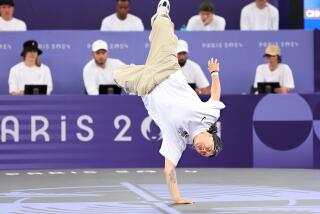South Korea’s Kim Yuna finds some breathing room in Los Angeles
A poised young woman sits at a table near the front of a pleasant restaurant in a pleasant suburb of Los Angeles. She speaks softly, politely, comfortable in an adult world. But there’s a little girl behind her mischievous grin as she plucks a roll from a basket across the table and spears a pat of butter to go with it.
If Kim Yuna had been home in South Korea she could not have brought the roll to her lips without a dozen photographers capturing the image and triggering a run on rolls at grocery stores. Fellow diners would have known her from her endorsements of electronics, cars or a cellphone named for her before she became her country’s first Olympic figure skating gold medalist.
She could not have gone unrecognized as she did in this place in the city she plans to make her home.
“If I walk in the street in Korea I am recognized,” she said. “Here, I think Koreans know me but no Americans.”
Her fans know her as Queen Yuna, luminous yet powerful in winning the 2009 World Championship at Staples Center and compiling a record point total at the Vancouver Games. She’s not quite 5 feet 4 but seems taller because of an elegant ease that bridges the worlds of athleticism and artistry. Like a skilled actor inhabiting a role, she draws audiences into her routines with sure-footed jumps and fluidly expressive movement.
“I’ve been dreaming of winning gold medal in the Olympics,” she said, “and I was very happy that this is not a dream anymore.”
But her life has not gone smoothly since then.
A month later, emotionally and physically spent, she lost the world title to her chief rival, Japan’s Mao Asada. In August she left her training base in Toronto following an acrimonious split with her coach of four years, Brian Orser.
She arrived in Los Angeles two weeks ago with no firm plans other than starring in the All That Skate show Oct. 2-3 at Staples Center, where she will share the billing with Michelle Kwan. She has been practicing at the rink Kwan owns, the East West Ice Palace in Artesia, but without a coach.
Besides skating and occasional ventures beyond the hotel — she visited South Coast Plaza and pronounced it “too, too big,” — Kim, her mother and one of her agents, Helen Choi, have been hunting for a house or apartment here, where she can get lost in the crowd while finding her way to the next phase of her life.
“I achieved everything that I wanted. Now I just want to enjoy my performances and try a lot of different characters in my performance,” she said.
“There is no pressure. I can breathe now.”
Before approving this interview, one of her agents, Hee-Sung Koo, stipulated Kim wouldn’t answer questions about Orser. “Yuna feels this is now behind her and is ready to move on,” Koo said.
Orser said the same, though his tone resonated with hurt.
According to Orser, Kim’s mother, Park Mehee, told him in early August his services were no longer needed. He hoped she’d reconsider. Rumors flew that Kim’s family felt Orser had neglected her; he said he meant to give her space. The family also was said to be infuriated by the possibility he might coach Asada.
Orser, who said he was paid by the hour instead of by contract, learned via the Internet that Kim would skip this season’s Grand Prix events. He also said she switched choreographers without consulting him.
“If it was the Mao situation, that was not the case. I’m not teaching Mao,” he said. “It was a hypothetical question and it wasn’t from the Mao camp.”
Orser is working with other fine skaters but said he has a place in his heart for Kim.
“I am very proud of her. Even through all of this, I don’t have one bad thing to say about her or her mom,” he said. “I admire her mom. We’ve just moved on.”
Kim’s priority is finding a coach “who can help me more mentally,” she said. “It’s hard to come back to competitive events after the Olympics.
“I think we will take it slowly and then decide. I am thinking to compete in world championships but I am only starting to be prepared.”
She first visited Los Angeles as a child, when South Korea’s skating federation sent skaters to Burbank and Lake Arrowhead to train. She has been embraced by the local Korean American community and returns its warmth.
“In the world championships here, a lot of Koreans were there, so I felt like I was skating at home. It helped me a lot,” she said.
“In Toronto and Los Angeles, too, there are a lot of Koreans — Koreatown, Korean markets. I feel like I’m at home and very comfortable. I think it’s easy to live here. They can help me or my family.”
Most of all, perhaps, by helping her to breathe easily.
helene.elliott@latimes.com
twitter.com/helenenothelen
More to Read
Go beyond the scoreboard
Get the latest on L.A.'s teams in the daily Sports Report newsletter.
You may occasionally receive promotional content from the Los Angeles Times.







